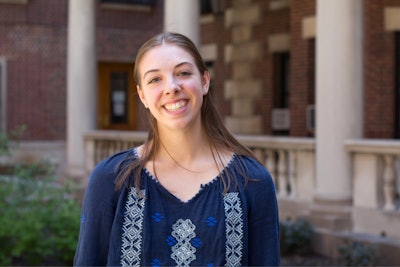 Grace Palmer
Grace PalmerIn just under a month, millions of college students in the United States would have celebrated their graduation ceremonies surrounded by family and friends, and begun the process of finding employment. Instead, they will have much more private and somber celebrations, and will graduate into a job market the likes of which hasn’t been seen since the Great Depression. As we heal from the pandemic and begin to rebuild the economy for today’s graduates, we can not blindly recreate a broken system, but must find the strength and imagination to rethink business as usual. In considering the future for the class of 2020, both coronavirus and climate change demand a new economy – one that is sustainable, equitable, and circular.
This May, graduating seniors face a world shaped by two crises unfolding on radically different timescales, but with a common trend. We know that climate change, relatively crawling at the pace of geology, has been cracking the lid off of the deep injustices of business-as-usual economics. Coronavirus, at the speed of a viral pandemic, is blowing off that same lid. Today’s “take-make-waste” fixation on endless economic growth has taxed the earth’s systems to the breaking point and simultaneously produced shockingly high levels of inequality. The impacts of these two crises are disproportionately borne by low income communities and people of color.
 Sandra Goldmark
Sandra GoldmarkTo address these twin challenges, we can’t simply rebuild. We have to redesign. The good news is that we have the blueprints at hand already. In the Recovery Act of 2009, the Obama administration tied industry bailouts to environmental oversight, a move so far rejected by the Trump administration. As we continue to design relief and stimulus packages, we must build in these oversights, to lay the groundwork for a more sustainable economy and transformation of key industries.
To tackle the inequality that exacerbates the impacts of both the coronavirus and climate change, we must protect our social safety nets and impose both a carbon tax and a wealth tax. Again, we’ve had these re-designs on hand for some time: both Democrats and Republicans have expressed support for a carbon tax, and last summer, US billionaires proposed a wealth tax to fight climate change and support health care. A wealth tax was recently proposed as a key to coronavirus relief. Coronavirus and climate change together demand that we finally move forward in making our economy more equitable.
Finally, our graduates will be better served by a circular economy, one that is “restorative and regenerative by design.” This means protecting critical and growing programs designed to reduce waste and protect resources, like the already under-funded NYC organics collection program, whose budget New York City mayor Bill de Blasio recently slashed. This means creating local jobs with smart policies, like the circular economy action plan recently released by the European Commission. On an individual level, this means changing the way we shop to prioritize reuse, as the Class of 2020 and their peers have already begun to do: resale has grown 21 times faster than traditional retail in recent years, led largely by shifts in consumption patterns among people ages 18-37.
In the midst of a crisis, reimagining our economic system may feel like a herculean task. But as Pope Francis recently said of this crisis, we must “have the courage to look ahead, and to be prophetic.” Now, in this collective reckoning, is the time to reject rebuilding a system that in the long run, will not serve the young people who will inherit it. But if you look closely, you’ll see that we already have everything we need to build a better system. Octavia Butler once said that “In order to rise from its own ashes, a phoenix first must burn.” The class of 2020 faces an economy in ruins, but the potential for rebirth is all around us.
Grace Palmer is a senior at Barnard College and Sandra Goldmark is a professor and the Director of Sustainability at Barnard College.


















